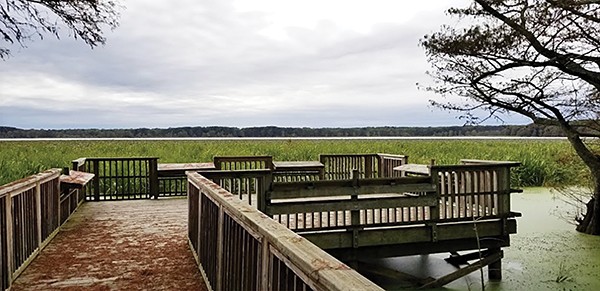In the evening, after the day’s heat has broken, I like to sit outside with a glass of wine and look up. The pale sky is filled with life: bats, swallows, hummingbirds, dragonflies, the passing night herons that live a few blocks over, and, usually, a solitary Mississippi kite, circling way up high, his shrill two-note whistle cutting through the pulsing cicada chorus. As darkness falls, you can gaze long and deep into the night sky, at the clouds, the moon, the endless throw of stars.
The natural world is always with us, even in the city. If you give it your attention, nature will reward you and give you a respite from our ever-chaotic politics and the nonstop social media melee. It’s easy to take these small pleasures for granted.
Sunday, a friend and I drove the backroads up to the Wapanocca National Wildlife Refuge in Arkansas. It’s a vast expanse of water and cypress swamp, with trackless flooded lowlands, miles of mossy sloughs, and a massive shallow lake filled with ancient cypress and blooming lily pads as far as the eye can see. It’s home to gar, catfish, bass, bream, snapping turtles, beavers, muskrats, bobcats, black snakes, probably a gator or two, and who knows what else.
 NFW.gov
NFW.gov
Wapanocca National Wildlife Refuge
Bald eagles, osprey, and red-tailed hawks patrol on high; wood ducks, indigo buntings, cardinals, and countless, nameless little birds flit through the green under-canopy. In the late fall, the lake and the sky above it are covered up with migrating waterfowl, creating sights (and sounds) well worth the 30-minute drive from Memphis. And it’s free.
America has a long and checkered history with its natural resources. In the 19th century, hunters almost wiped out the buffalo, exterminated the passenger pigeon, and decimated countless other species. Corporations strip-mined our mountains, denuded our lands of their trees, poisoned our water, polluted our air, and killed countless creatures, big and small, all in pursuit of the almighty dollar. We learned the hard way that, left unchecked, profit-driven entities won’t hesitate to destroy the environment.
We started figuring it out, maybe just in time. Thanks to President Teddy Roosevelt, the U.S. created a National Park system to preserve some of our precious wild spaces. Cities and states have followed suit, creating public parks and natural areas for their citizens. With the public’s support, Congress began passing laws protecting our air and water and wildlife. According to a March 2018 Gallup poll, more than 75 percent of Americans think protecting our environment is important; 62 percent think the government should be doing more to protect it. To which, the Trump administration has said, meh, not so much.
In its two-and-a-half years of existence, this administration has opened millions of acres of previously protected federal land to mining, oil, and timber operations. It’s weakened off-shore drilling regulations. It’s cut or eliminated many EPA air-pollution regulations.
We’ve gotten used to this, at some level — Trump’s predilection for appointing agency heads who seem uniquely qualified to destroy the very departments they are charged with running. You may remember — though it’s sometimes difficult to keep up with the revolving doors of Trump’s cabinet — that the president initially appointed the spectacularly sleazy Scott Pruitt to head the EPA. Pruitt was eventually forced out for being too corrupt, even for this administration, which is pretty damn corrupt. Before Pruitt left, he lifted key controls on air pollution, rolled back vehicle fuel efficiency standards, and even reversed the ban of the neurotoxic pesticide chlorpyrifos, against all advice from EPA scientists. Pruitt then purged the EPA’s pesky science advisory panels. Pruitt was followed by a “temporary” EPA director, Andrew Wheeler, who is still running the agency.
Now, the president and his team are planning to gut the Endangered Species Act — you know, the law that saved the bald eagle from extinction. Why? Why do you think? So corporations can stop worrying about the silly otters and brown trout and Mississippi kites and get about the business of pillaging our environment for profit.
It’s enough to make a man want to go outside and gaze long and deep into the night sky, at the clouds, the moon, the endless throw of stars.